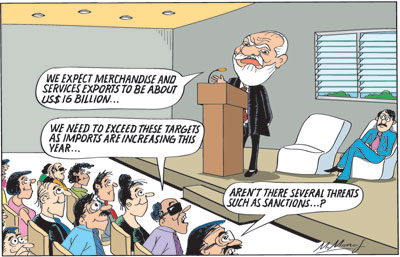Columns
Increasing exports vital to improve balance of payments and foreign reserves
View(s):However, they are not a panacea for the country’s external financial vulnerability. Only a palliative to overcome the immediate crisis in external finances. In fact, these financial facilities will increase the country’s foreign debt. They too have to be repaid as scheduled.
 Strengthen reserves
Strengthen reserves
This infusion of US$ 1.5 billion into the country’s foreign reserves would no doubt strengthen the foreign reserves and assist in meeting the immediate debt repayments. However, they increase the country’s debt stock and would require to be repaid as agreed.
The conditions on which these facilities would be obtained are not known. The interest rate for the loan, the period of repayment and whether other conditions are attached to it are unknown. These conditions would matter.
Solution increasing exports
A solution, rather than an immediate relief to the perilous state of the country’s external financial vulnerability, could come only by increased exports.
As pointed out in last Sunday’s column, a significant increase in exports is vital to improve this year’s trade balance and balance of payments, as imports are expected to increase substantially this year. Such a significant increase in exports are possible, if the current initial global economic recovery gains momentum and manufacturers could respond to them.
There are also several imminent threats that should not materialise.
Export expectations
The Export Development Board (EDB) expects merchandise exports to increase to US$ 12 billion from US$ 10.94 last year and services exports such as ICT services to bring in US$ two billion.
Both these projections are quite realistic. In fact, if there are no serious setbacks to the global economic recovery and increasing international demand, merchandise exports could exceed the EDB target to reach about US$ 14 to 15 billion.
 Economic recovery
Economic recovery
The expectation of increased exports is based on the international economic recovery gaining momentum. There are good reasons to expect this. Foremost among them is the mass vaccinations around the world. Lockdowns are rare and economic life is returning to near normal around the world.
Furthermore, the demand for apparel and rubber goods manufactures are increasing, while there is a continuation in demand for personal protective equipment (PPE). The control of the virus within the country would also enable factory production at full capacity. If these favourable conditions continue, merchandise exports could increase to US$ 14 to 16 billion.
Manufactured exports
A significant increase in manufactured exports are possible if the pre-COVID demand for apparel and rubber goods is restored, while last year’s demand for personal protective equipment (PPE) continues. There are indications that this could happen. However agricultural exports are unlikely to expand as there are limitations to increasing production of tea, rubber, coconut and spices in the short run. Only a long term investment strategy could enhance these exports in due course.
Seafood exports have also been disappointing. After the onset of COVID, there was an increased demand for seafood owing to a shift in demand from meats to fish. However, this did not continue later in the year and seafood exports decreased later in 2020. The EDB however expects an increase in seafood exports.
Threats
Despite these favourable prospects for exports, there are several threats. The most serious threat to increasing exports arise from the possibility of economic sanctions from countries that are the most important markets for our manufactured exports.
There is a broad consensus that the Government handled the UNHCR resolution on human rights violations in a brash and undiplomatic manner. A more adroit, conciliatory and diplomatic manner could have minimised adverse repercussions.
Economic sanctions
An amended UNHCR resolution is likely to be passed later this month. This however does not mean that the UNHCR could take any punitive measures against Sri Lanka. However, individual countries can adopt trade sanctions to curtail exports to their countries.
The countries that may impose such sanctions are the US, Canada, EU and Britain, with the US a non-member of the UNHCR, joining in. These constitute the main markets for our manufactured exports. Any restrictions on our exports would be a serious blow to our trade and balance of payments and external finances.
Economic diplomacy
It is critically important for the country to move quickly to repair the recent discord with these important countries. Professional diplomats must be asked to approach countries to diffuse tensions. Such economic diplomacy is the urgent need of the hour.
Summary
Since Imports are expected to increase to over US$ 18 billion this year, despite import restrictions, merchandise exports need to increase to about US$ 14 billion to minimise the trade deficit. This is possible as the international demand for many of our manufactured exports, especially rubber goods, protective equipment and apparel is increasing. An export growth of ICT services is also anticipated. Earnings from tourism too would increase to about US 1.5 billion.
Concluding reflection
The country’s export performance could be severely thwarted by economic sanctions as a follow-up of passing the UNHCR resolution on human rights. It is therefore critically important that the government engages in a diplomatic dialogue to prevent such an eventuality. It is by a constructive dialogue and actions to remedy and prevent human rights violations that economic sanctions could be averted.



Leave a Reply
Post Comment